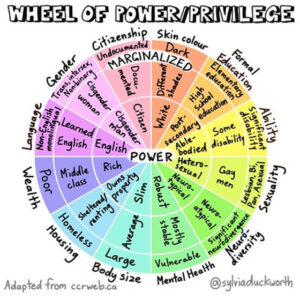Social media and activism have certainly played a role in my life. Upon learning about my own privileges back in 2014, it became very important for me to play an active role in social justice and anti-oppressive work. A large part of my learning was through Instagram and following activists and leaders in the area to learn from. However, until reading ‘What Kind of (Digital) Citizen?‘, I did not realize I was only functioning largely on a personally responsible citizenship level. Here are some of my favourite justice oriented activists that I follow:
Some of the things that I have learned over the years from these and other activists in terms of my role as a person of privilege on social media are:
- Performative activism is not enough to make real change. Taking conversations beyond putting a filter on a picture is where real change happens. It is important to start with yourself and be able to deconstruct your own learnings and thoughts that may contribute to our oppressive society. From there, expand to your inner circles of family and friends in being able to have open conversations about societal issues and social justice.
- My voice as a person of privilege does not need to hold space in every social justice setting. However, my ability to use my privilege to listen to and amplify the voices of those who are greatly impacted does matter.
- There will be times when you make mistakes. If you are trying to learn, and are open and gracious to learning new ways of speaking, thinking, and living, then you are on the right track.

Retrieve from https://static.wixstatic.com/media/ccc935_d86787a1ac994575a1395aa2540ffc64~mv2.jpg/v1/fill/w_560,h_560,al_c,lg_1,q_80/ccc935_d86787a1ac994575a1395aa2540ffc64~mv2.jpg
Can online social media activism be meaningful and worthwhile?
In order to really review how meaningful social media activism is, I had to look at some research from the Pew Research Center. According to surveys done in the US, the majority of people believe that social media activism is able to bring widespread awareness to people. There are so many movements that could be deemed successful because of social media and its ability to access so many people. However, people also acknowledge that social media activism can give individuals and organizations a false sense of action, meaning that they feel like they are making meaningful change by posting and sharing. This could also be considered performative allyship. Therefore, it is important to listen to voices leading the cause to best understand what their goals are and how we can all contribute to help!
My friend Len Goertz took to Instagram recently to talk about performative allyship in the context of Pride month this June. Check out his video here! This concept does not only apply to people but businesses and corporations. It is important as a consumer to be critical and consider where the messages they are posting on social media are coming from. Additionally, what actions beyond social media are being taken.
Is it possible to have productive conversations about social justice online?
When it comes to social media, for the most part, we create our own communities. Oftentimes, when we are creating these personal digital spaces we often fill them with people who are like-minded and share similar ideologies. Therefore, from my experience productive conversations can happen when you are a member of these groups.
There are times however when there are conflicting viewpoints. Often these conversations will be surrounded by dialogue where they are trying to change the other person’s perspective. The following TedTalk video discussed how a person’s beliefs, values, and who they trust can impact being able to do this. This can be challenging to do when you are conversing with strangers online. That being said, you do not need to change someone’s mind to have a productive conversation. Netsafe wrote an article on how to respectfully disagree with someone online. In the article they discuss staying calm, using first-person statements, not getting personal, acknowledging the person’s point of view, and knowing when to leave the conversation. The question is, how often are these principles applied?
What is our responsibility as educators to model active citizenship online?
Direct teaching of digital citizenship is incredibly important in education. It is inevitable that students will be accessing social media and interacting with others online. On average students begin to access social media at about twelve and a half years old. Therefore being able to model how to be responsible and respectful digital citizens plays a large role in educating students. For educators, being aware of what we are sharing online is incredibly important and tells others who we are and what we stand for. Being a responsible citizen can include privacy settings, demonstrating who and how to interact with others online, and how to critically think about what you are reading or looking at in order to stay safe.
